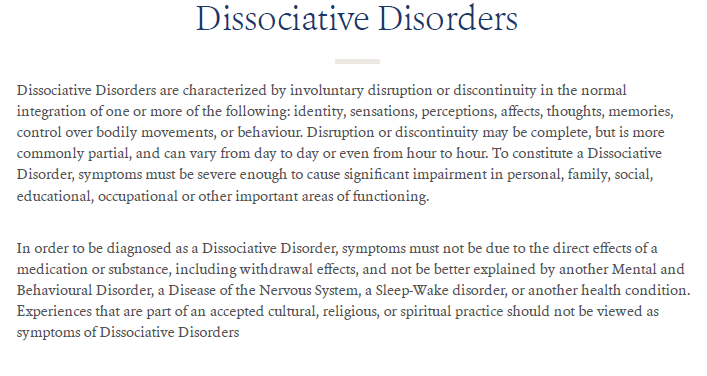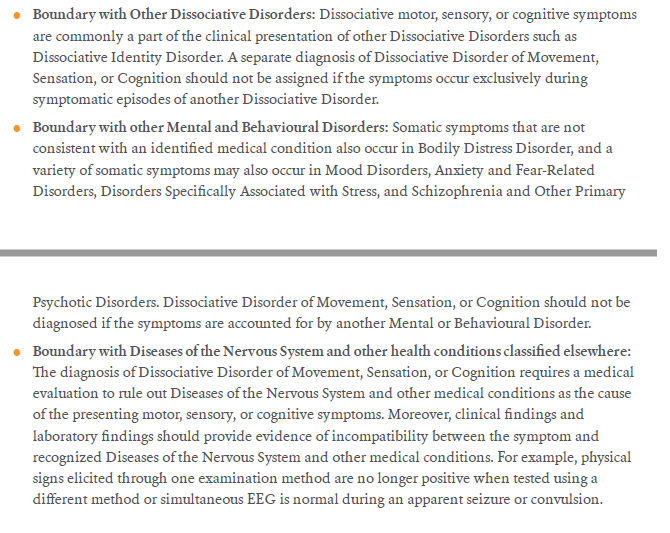From my archived content:
(The content appended in blue is longer available on the Orange ICD-11 platform as the platform was moved to a new domain several years ago and some of the earlier Proposals and comments on those Proposals were lost in the migration process.)
From the ICD-11 Beta Proposal Mechanism, January 2015.
At this point, TAG Neurology had dragged a number of categories into the Beta draft's Neurology chapter that had hitherto had equivalents in the ICD-11 Beta draft's Dissociative disorders block.
One of these proposals had been for a "Functional disorders of the nervous system" block under which it was proposed to locate a number of disorder categories. These were intended by TAG Neurology's chair to replace the terminology being used in the Mental disorders chapter up to that point and to remove the "Dissociative" element.
Shakir and colleagues had even put out a couple of papers stating that these new Functional neurological categories
would be included under Neurology for ICD-11.
Below, Dr Geoffrey Reed (Senior Project Lead for revision of the Mental disorders chapter), proposed in January 2015 to delete these new disorder categories and posted a rationale is support of their not remaining in the Neurological chapter.
Their deletion from the Neurology chapter was swiftly implemented and these categories were dragged back kicking and screaming into the sole domain of the Mental disorders chapter.
It wasn't until June 2018, that Dr Reed actioned the secondary parenting of the
Dissociative neurological symptom disorder term and its subclasses under the Neurology chapter.
Although FND is not my primary area of advocacy, it was fascinating to observe the turf war playing out between the internal Senior Project Lead for revision of the Mental disorders chapter, the external Topic Advisory Group for Neurology (or at least its chair) and the ICD Revision Steering Group during the 7 or so years of the Alpha and Beta drafting stages, the shunting back and forth and the multiple changes of disorder names.
-------------------------------
ICD-11 Beta Draft Proposal Mechanism
January 10, 2015
Proposal
Functional disorders of the nervous system
Delete Entity Proposal
Proposal for Deletion of the Entity
Proposal Status: Submitted
Functional disorders of the nervous system
Rationale
This grouping should be deleted.
These are by definition not neurological conditions, as indicated by the phrase included in the definitions provided: 'in which there is positive evidence of either internal inconsistency or incongruity with other neurological disorders'.
If there is no evidence of a neurological mechanism or etiology, the rationale for including these in the classification of neurological disorders is unclear to say the least.
In contrast, these have always been viewed as mental disorders (from the days of Sigmund Freud), and there is no evidence about their etiology or mechanism that is inconsistent with that formulation.
Prior to ICD-10, these conditions were conceptualized as Conversion Disorders. This terms is considered obsolete because it refers to a psychodynamic mechanism that is theoretical and not ideally descriptive. ICD-10 offered a transitional title, calling them Dissociative [conversion] disorders.
For ICD-11, the proposals for Mental and Behavioural Disorders refer to these as Dissociative disorders, dropping the 'Conversion' part of the term.
Dissociative disorders are defined descriptively, as 'characterized by disruption or discontinuity in the normal integration of memories of the past, awareness of identity, immediate sensations, and control over bodily movements that are not better explained by another mental and behavioural disorder, are not due to the direct effects of a substance or medication, and are not due to a neurological condition, sleep-wake disorder, or other disorder or disease. This disruption or discontinuity may be complete, but is more commonly partial, and can vary from day to day or even from hour to hour.' There is not basis for suggesting that this formulation is inconsistent with the phenomena proposed for inclusion here as 'Functional clinical forms of the nervous system'.
The fact that neurologists may be asked to evaluate these conditions is not an adequate rationale for defining them as neurological disorders, nor are concerns about reimbursement policies that are unwisely based on divisions among specialists' scope of practice based on ICD chapters.
The Mental Health TAG is aware that there is a vocal group of advocates for this terminology among neurologists. In fact, this terminology was included as alternate terminology in DSM-5. However, in DSM-5, these are still very clearly classified as Mental disorders.
Similarly, these terms can be added as inclusion terms to the equivalent categories in the Mental and behavioural disorders chapter.
In spite of its popularity among at least some neurologists, this terminology is currently viewed in psychiatry as obsolete, and based on a mind-body split (division between 'organic' and 'non-organic') we are elsewhere attempting to remove from the ICD-11. The implied contrast is between a 'real' (medical) disorder and a 'functional' (psychiatric) disorder.
A further problem with this terminology is its inconsistency with WHO's official policy use of terminology related to 'functioning' (function, functional), as defined in the ICF.
In some instances of the use of the term 'functional' in other parts of proposals for ICD-11, it is not clear that the proposals use the term 'functional' in this same sense, or if they mean something close to 'idiopathic'. However, it is quite clear that what is meant in this group of proposals is 'without neurological explanation or plausible or demonstrable etiology'.
However, this terminology is in any case problematic. In addition to requesting that this group of categories be deleted from the classification and instead integrated appropriately as inclusion terms in the chapter on Mental and Behavioural Disorders, the Mental Health TAG requests that the Classifications Team examine other uses of the term 'functional' in proposals for ICD-11 and consider either appropriate parenting in Mental and behavioural disorders or alternative terminology.
The Mental Health TAG also requests that this issue be revised by the Revision Steering Group (and or Small Executive Group) in order to arrive at an ICD-wide solution as efficiently as possible. The Mental Health TAG requests that this issue not simply be arbitrated by the same TAGs that have made these proposals.
--On behalf of Mental Health TAG
References
There are no references attached for this proposal item
--------------------------
And on January 12, 2015, Dr Reed added a further comment for TAG Neurology and the Revision Steering Group:
An alternative could be that this grouping could be retained but with appropriate primary parenting to Dissociative disorders in the Mental and behavioural disorders chapter.
Entities of 'functional clinical forms' have already been proposed to be added in the appropriate categories in Dissociative disorders. Most of them are included in Dissociative motor disorder, though several are included in Dissociative disorder of sensation. One is included in dissociative amnesia.
However, the name of these entries-- i.e., functional disorders-- remains an issue as described above, which should be resolved at the ICD-wide level.
Note that if the solution selected involved retaining these categories, perhaps renamed, but primary parenting them appropriately in Dissociative disorders, it will be more appropriate to move the secondary parented categories to the main Disease of the nervous system chapter rather than listing them in clinical forms.
--On behalf of the Mental Health TAG
Geoffrey Reed 2015-Jan-12 - 09:14 UTC



